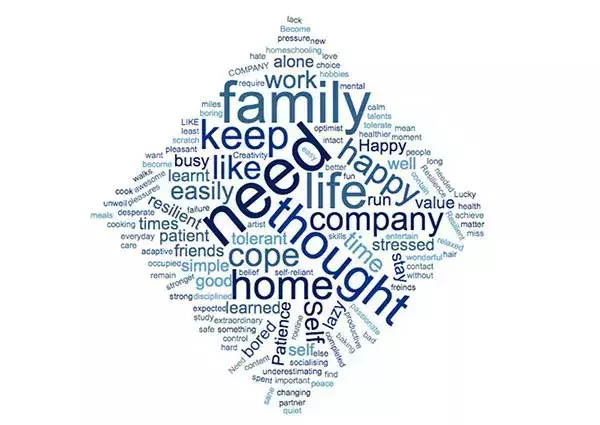
Reflections on the lockdown experience
To coincide with Opportunity in Adversity: Mastering the Art of Self-Renewal, i-coach wanted to understand the impact of lockdown in detail, so we sent out a survey inviting people to share their reflections on the experience.
We asked 300 people across the country to participate in our survey. Respondents were drawn from all backgrounds and ages. The gender split was even. Here is an overview of the findings.
We will focus on themes rather than numbers, as it is the individual human experience we sought to understand better.
Relationships
It will come as no surprise that relationships were on people’s minds.
While an overwhelming majority of respondents said they missed their friends, they appeared to be pragmatic about the situation. A significant portion remarked upon the fact that they strengthened existing connections and made new ones, often in the local area.
Community was therefore a huge theme. People reported that they felt a greater sense of community than before lockdown. The kindness of people, the fact that people felt more connected to their neighbours and ‘street spirit’ were mentioned a number of times. It surprised us to see that this held true even the case in stereotypically ‘frosty’ London.
What we saw time and again in the responses was that people had become more discerning about people in their lives and the quality of their connections.
People appreciated the time they got to spend with family, remarking upon how little or how long it took to argue with the people they shared their lockdown experience with.
And when it came to the relationship between citizens and the state, when respondents were asked what they wanted the government to prioritise, it was the health and wellbeing of the country (vaccines, care packages, the NHS) followed by support for businesses. Interestingly, only one person mentioned an issue that directly and specifically affected them in that moment (rent arrears).
The 9-5
When it came to careers and work the first thing to say is that people did not miss their commute to work. At All. It will come as no surprise at all that the majority of respondents were not sad in the least to leave the early starts, commuting or traffic behind. Given that the line between home and work has been blurred, we expected at least one person to say they missed their commute as it helped them to transition from ‘work time’ to ‘hometime’ but not one person did.
In fact, for all the extra demands on us: homeschooling, keeping children occupied, checking in more with colleagues, we actually preferred working from home. A significant proportion of respondents said that if they could keep one thing up following lockdown, it would be working from home more.
People overwhelmingly reported that they enjoyed the flexibility that the change in situation afforded them. Some reported that they actually felt more productive, getting round to work tasks that they had, until then, put off.
People were happy to have more autonomy over how they spent their day, appreciating local parks and nature, using it as an opportunity to switch off.
And, as much as we might say we miss seeing our colleagues in team meetings, if our results are to be believed, we actually don’t miss our colleagues at all either (!)
Self-discovery
People overwhelmingly responded that they were surprised at their ability to cope well with the changes, stress and uncertainty of the situation. They reported that they were surprised at their ability to find meaningful activities to keep them occupied. While boredom was mentioned a few times and carries its own stresses, we found this to be worth reflection on as it suggests that we weren’t spinning as many plates or dashing from one thing to another without a break as we perhaps first assumed.
Flexibility and a willingness to embrace change in all its forms is definitely something to be proud of and build upon.
We asked the respondents how they would spend £1000 to invest in themselves, travel, hobbies, personal trainers, development courses and paying off debts were the most prevalent areas.
As expected, The lockdown experience wasn’t so positive for others. One person reported that they had been made redundant, another person reported their spouse was faced redundancy too. Another person said they felt like a failure.
There is no doubt that coronavirus and it’s impacts have been a ‘rock bottom’ for thousands.
I would encourage people to consider that rock bottom as the base on which they build a new life of purpose and meaning, a life that really makes them happy and aligns with their values and interests, a path which truly leads to fulfilment. It’s even more important to reflect on who we are, what motivates us and what we value as we plan our next steps.
Personal reflections
It is clear from the survey results that people were surprised at just how able they were to cope.
What really stood out in the responses, was that while people were naturally worried and stressed, the tone of their responses was positive and pragmatic.

This reinforces our findings that people reported they were better able to cope than they perhaps thought. Hopefully this exercise highlights the positive effects of lockdown that we may wish to hold on to.
Thank you to all the respondents who took part. If anything, I hope that this survey afforded you all an opportunity to pause and reflect on the experience and that perhaps it could become something you regularly practice yourself.



